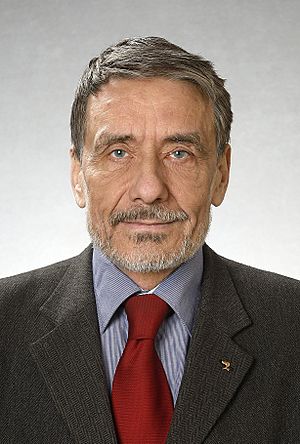Paul-Eerik Rummo facts for kids
Quick facts for kids
Paul-Eerik Rummo
|
|
|---|---|

Paul-Eerik Rummo in 2011.
|
|
| Minister of Population and Ethnic Affairs | |
| In office 2003–2007 |
|
| Prime Minister | Juhan Parts Andrus Ansip |
| Preceded by | Eldar Efendijev |
| Succeeded by | Urve Palo |
| Minister of Culture and Education | |
| In office 1992–1994 |
|
| Prime Minister | Mart Laar |
| Preceded by | Rein Loik |
| Succeeded by | Peeter Olesk |
| Personal details | |
| Born | 19 January 1942 Tallinn, Estonia |
| Spouse | Viiu Härm |
| Children | 3 |
Paul-Eerik Rummo, born on January 19, 1942, is a well-known Estonian writer and politician. He has written many poems and plays, and he has also worked as a translator. In the Estonian government, he served as a minister, looking after important areas like culture, education, and population matters.
Paul-Eerik Rummo was born in Tallinn, the capital city of Estonia. His father, Paul Rummo, was also a writer. Paul-Eerik studied literature at the University of Tartu, finishing his studies in 1965. He also spent time working in theaters in Estonia.
Contents
Family Life
Paul-Eerik Rummo is married to Viiu Härm. She is an actress, a poet, and a translator. They have three daughters together.
Speaking Up for Estonia
In October 1980, Paul-Eerik Rummo was one of forty important Estonian thinkers who signed a special letter. This letter was called the "Letter of 40 Intellectuals." In it, they spoke up for the Estonian language and culture. They also shared their concerns about how the government handled youth protests in Tallinn. These protests had started because a local band's public performance was stopped.
Paul-Eerik Rummo's poetry has become a symbol of standing strong for Estonian culture. For example, in the novel Purge by Sofi Oksanen, his poems are used to show resistance and strength.
Government Roles
Paul-Eerik Rummo has held important positions in the Estonian government.
Minister of Culture and Education
From 1992 to 1994, he served as the Estonian Minister of Culture and Education. In this role, he helped guide policies related to schools, arts, and heritage in Estonia.
Minister of Population and Ethnic Affairs
Later, from 2003 to 2007, he was the Estonian Minister of Population and Ethnic Affairs. This job involved working on issues related to the people living in Estonia and different cultural groups.
External Links
- Estonian Writers Online Dictionary
| Political offices | ||
|---|---|---|
| Preceded by Rein Loik |
Estonian Minister of Culture and Education 1992–1994 |
Succeeded by Peeter Olesk |
| Preceded by Eldar Efendijev |
Estonian Minister of Population and Ethnic Affairs 2003–2007 |
Succeeded by Urve Palo |
 | Stephanie Wilson |
 | Charles Bolden |
 | Ronald McNair |
 | Frederick D. Gregory |

